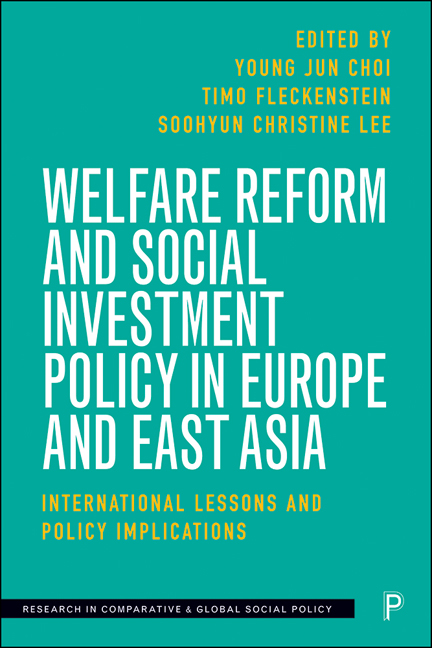 Welfare Reform and Social Investment Policy in Europe and East Asia
Welfare Reform and Social Investment Policy in Europe and East Asia Book contents
- Frontmatter
- Contents
- List of figures and tables
- Notes on contributors
- Acknowledgements
- Preface from the series editors
- 1 Introduction: social investments and welfare reform in Europe and East Asia
- 2 Work–family policy expansion and the idea of social investment: the cases of Germany, England, South Korea and Japan
- 3 Private education in South Korea: lessons for the West from past mistakes?
- 4 How do family background and shadow education affect academic performance and labour market outcomes in South Korea? Reasons for redistributive social investment
- 5 Employability, higher education and the knowledge economy
- 6 Does social investment make the labour market ‘flow’? Family policies and institutional complementarities in Italy, Spain, Japan and South Korea
- 7 The social investment approach and gender division of housework across East Asia and Europe
- 8 Employment outcomes of social investment in latecomer countries
- 9 Estimation of the human capital depreciation rate: an international comparison and policy implications in South Korea
- 10 Changing patterns of grandparenting and their implications for active ageing in England and South Korea
- 11 The governance of social investment policies in comparative perspective: long-term care in England and South Korea
- 12 Towards greater social investments and equality in Europe and East Asia: policies and politics
- Index
10 - Changing patterns of grandparenting and their implications for active ageing in England and South Korea
Published online by Cambridge University Press: 21 December 2021
- Frontmatter
- Contents
- List of figures and tables
- Notes on contributors
- Acknowledgements
- Preface from the series editors
- 1 Introduction: social investments and welfare reform in Europe and East Asia
- 2 Work–family policy expansion and the idea of social investment: the cases of Germany, England, South Korea and Japan
- 3 Private education in South Korea: lessons for the West from past mistakes?
- 4 How do family background and shadow education affect academic performance and labour market outcomes in South Korea? Reasons for redistributive social investment
- 5 Employability, higher education and the knowledge economy
- 6 Does social investment make the labour market ‘flow’? Family policies and institutional complementarities in Italy, Spain, Japan and South Korea
- 7 The social investment approach and gender division of housework across East Asia and Europe
- 8 Employment outcomes of social investment in latecomer countries
- 9 Estimation of the human capital depreciation rate: an international comparison and policy implications in South Korea
- 10 Changing patterns of grandparenting and their implications for active ageing in England and South Korea
- 11 The governance of social investment policies in comparative perspective: long-term care in England and South Korea
- 12 Towards greater social investments and equality in Europe and East Asia: policies and politics
- Index
Summary
Introduction
Since 2000, social investment has risen up the policy agenda across the globe. The idea is to replace the traditional welfare state strategy – that is, providing direct cash benefits, with a social investment state which focuses on human capital development in order to afford sustainable economic growth and the welfare of the population (Hemerijck, 2007: 12–13). Social investment strategy emphasises preparing rather than repairing, focusing on the roots of social problems. In that regard, social investment strategies call for investing in children to maximise their life-cycle opportunities, from which principle has emerged the key strategy of expanding childcare services. Childcare provisions enable parents, particularly young mothers, to remain in the paid labour market, and improves children's life chances by preparing them for future human capital development (Esping-Andersen et al, 2002).
At the same time, there has been growing interest in the provision of informal childcare that complements formal childcare arrangements. People, especially women, in their fifties and sixties, have relatively low labour market participation rates, but they play a central role in enabling mothers with children under 5 years old to take up or remain in paid work (Hank and Kreyenfeld, 2003; Gray, 2005). Research has also increasingly underlined the importance of grandparenting that facilitates child development, and raising a grandchild simultaneously influences grandparents’ motivation to keep healthy and in touch with their grandchildren (Coall and Hertwig, 2011). Thus, it looks like a win–win situation, as grandparenting benefits not only grandchildren but also grandparents. Besides the positive evidence, however, it has also been suggested that grandparenting may have a harmful impact on the grandparents’ health and social engagement (Minkler and Fuller-Thomson, 1999; Chen and Liu, 2011; Grundy et al, 2012).
This chapter seeks to understand the equivocal findings of previous studies by analysing multiple aspects of grandparenting, and examines the cost–benefit trade-offs of grandparenting while being mindful of policy contexts such as public childcare services. To examine whether and how childcare programme correlates differ across a wide range of contexts, this study focuses on grandparenting in South Korea (hereafter, Korea) and the United Kingdom. This chapter uses data from the Korea Time Use Survey (K-TUS) and UK Time Use Survey (UK-TUS) to analyse the amount of time spent by older adults in providing childcare, and their general use of time in other activities.
- Type
- Chapter
- Information
- Welfare Reform and Social Investment Policy in Europe and East AsiaInternational Lessons and Policy Implications, pp. 265 - 290Publisher: Bristol University PressPrint publication year: 2021


